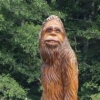The largest monkey now in the new world is 25 lbs. If anything evolved in the new world that is not known now in the fossil record, it could have evolved completely independently of monkeys. The present ice age cycle has been running over 2,1 million years now. For the first part of that they started every 41,000 years. For the last 800,000 years they occur every 100,000 years. The interglacial periods like we are in now only last 10,000 to 12,000 years. BF or its ancestors could have arrived anytime during the low water levels during any of the ice ages as likely did the monkeys. For all that matter as old as human existence seems to be in South America that is currently pushing towards 30,000 years ago, maybeo some Polynesian sea farers brought monkeys with them.
To make it clear there is no evidence of BF ancestry in the Americas. But lack of evidence does not rule it out completely. They came from someplace. But they seem very well adapted to life during and between ice ages so could have been here a very long time, perhaps through several ice age cycles. Since their prime habitat is in the Northern Sierra Nevada and the Cascades of the PNW and Canada, volcanism likely has destroyed much of the evidence of their existence. What volcanism has not destroyed, the glaciers grinding out of the mountains during the ice ages have finished the job. The super volcano hot spot that is now underneath Yellowstone park, worked its way across Oregon, and Idaho, to its present location. Now and then erupting violently, in a matter that makes the St Helens eruption look small. Mt Mazama, now Crater Lake, likely erupted during the time BF was in North America. If mankind had originated in North America instead of Africa, the unstable geology of North America would likely have destroyed all existence of our origins. The Cascades were preceded by a mountain range even larger that has nearly completely eroded away. Africa, especially the cradle of humanity, were all evidence of early man has been found, has changed little in 100s of millions of years.


